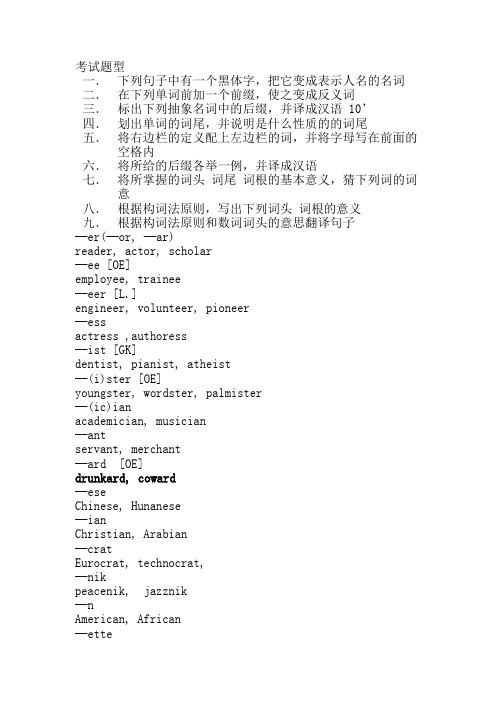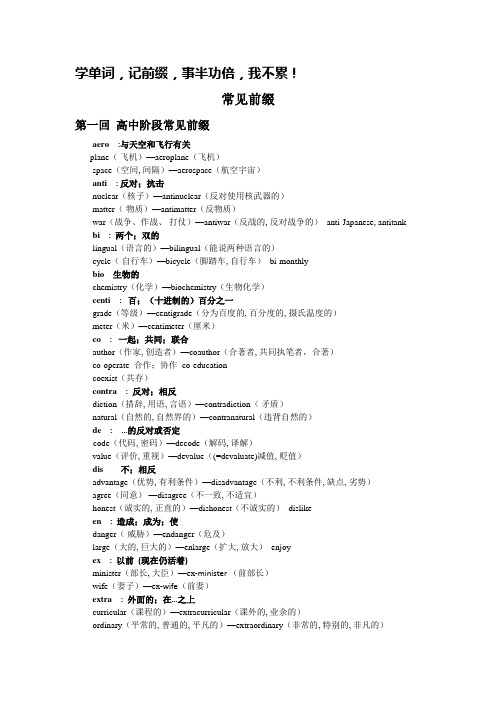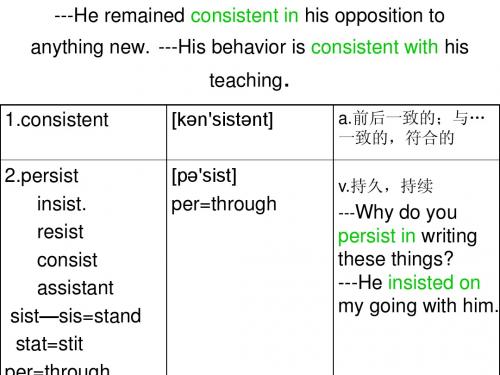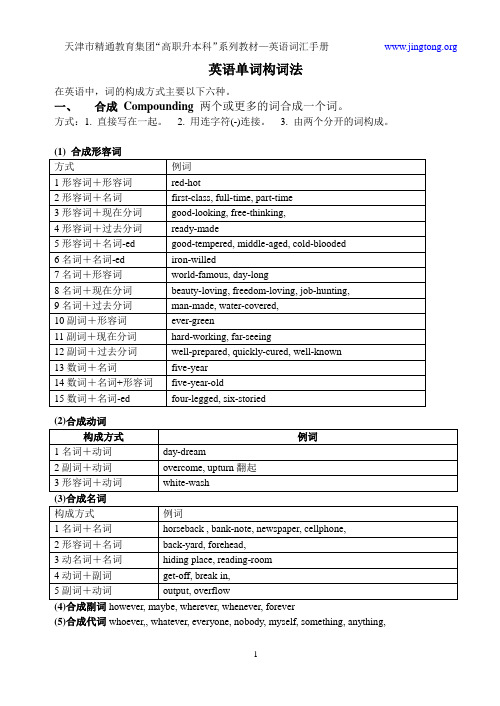构词法(2)
英语构词法 (2).

考试题型一.下列句子中有一个黑体字,把它变成表示人名的名词二.在下列单词前加一个前缀,使之变成反义词三.标出下列抽象名词中的后缀,并译成汉语 10’四.划出单词的词尾,并说明是什么性质的的词尾五.将右边栏的定义配上左边栏的词,并将字母写在前面的空格内六.将所给的后缀各举一例,并译成汉语七.将所掌握的词头词尾词根的基本意义,猜下列词的词意八.根据构词法原则,写出下列词头词根的意义九.根据构词法原则和数词词头的意思翻译句子─er(─or, ─ar)reader, actor, scholar─ee [OE]employee, trainee─eer [L.]engineer, volunteer, pioneer─essactress ,authoress─ist [GK]dentist, pianist, atheist─(i)ster [OE]youngster, wordster, palmister─(ic)ianacademician, musician─antservant, merchant─ard [OE]drunkard, coward─eseChinese, Hunanese─ianChristian, Arabian─cratEurocrat, technocrat,─nikpeacenik, jazznik─nAmerican, African─ettecigarette, statuette, roomette─kinlambkin, manikin, prince kin─letkinglet, booklet, ringlet─lingduckling, prince ling, birdling ─enmaiden, chicken, kitten─elparcel,model,citadel─etfloweret, islet, tag let─cleparticle, molicle─(e)teriafruiteria, grocerteria二.加前缀法.表示否定的前缀:A.纯粹表示否定的有:a-,dis-,in-,non-,un-;B.表示“错误”的有:mis-C.表示“反动作”的有:de-,dis-,un-D.表示“反对”的有:anti-,contra-,counter-atypicalamoralatheism 无神论asexual 无性别的anonymous在辅音h(不发音)之前也用an-:anarchism无政府主义dishonestdisagreedisallow 不许,拒绝discouragedisforest 砍伐树林dissolvedispel 驱散inhuman不人道的illegalImmoralirresponsibleirresistible 不可抵抗nonconductor 非导体nonmetal 非金属的nonstopnon-standard 不标准的unhappyuncomfortableunsystematic无系统的unlimitedunworldly非现世的uneducatedUncivilized未开化的misbehave行为不当misprintmisplay(球类等运动中)失误misleadingdevaluation贬值de-表示“remove from”deport驱逐出境deforest砍伐森林degas 排气消除毒气unbutton 解纽扣uncover 揭开盖子untomb从坟墓中掘出antipathy 憎恶anti-Japanese war 抗日战争antidote 解毒药antacid 防酸剂Antarctic 南极contradict反驳 ,同…相矛盾contrary 相反的counteract 还手counterplot 将计就计counterview 反对意见retroact 倒行,起反作用retrospect 回顾 retrogress倒退三.抽象名词词尾•─age•marriage, shortage, postage•─al•approval, denial, refusal•─ance•assistance, elegance,brilliance•─cy•accuracy, Intimacybankrupcy•─dom•freedom, wisdom, filmdom•─ful•glassful, handful, houseful•─hood•fatherhood, Childhoodneighborhood•─ing•bedding, learning, washing•─ism•Marxism, socialism, Londonism•─ity (-ty)•curiosity, majority, unity,•safety•─ment•argument, development, instrument•─ness•friendliness, goodness, carelessness •─ship•authorship, citizenship, leadership•─ure•failure, departure, closure, exposure ---ery, --ry•robbery, greenery, nurserysurgery, slavery, poultry, poetry•─®ama•telerama, cinerama•─itis•appendicitis(阑尾炎)odontitis(牙炎),neuritis(神经炎)•─th•growth, warmth, fourth四.单词词尾☐加否定前缀“in- (及其变体)”, ‘‘non-, un-” 构成下列单词的反义词:☐1. im mature 2. ir regular☐3. in considerate 4. ig noble☐5. non-contentious☐6. il legitimate☐7. non-metal☐8. im passive☐9. non-ferrous☐10. in accuracy☐11. un endurable☐12. in variance☐13. non-inductive☐14. il legible☐15. un reasonable☐16. ir rational☐17. un scrupulous☐18. non-staple☐19. im balance☐20. il legalize☐写出下列单词中前缀的意思:☐1. ante cedent 2. by product☐3. in clude 4. intra mural☐5. intro spect 6. post graduate☐7. pre cede 8. retro spect☐9. super man 10. pro ceed☐11. sub scribe 12. trans mit☐13. ultra-red 14. a pocopeEx. 2写出表示数目的希腊语前缀和拉丁语前缀:☐希腊语前缀拉丁语前缀☐half hemi- demi-, semi-,☐one mono- uni-,☐two di-, duo-, bi-☐three tri-☐four☐five☐six☐seven☐eight☐nine☐ten☐hundred☐thousand将右边栏里的定义配上左边栏里的词, 并将字母在前面的空格内 :☐1. ___ audio logy a. the study of speech sound☐2.___ audiometer b. an instrument used tomake weak sounds louder☐3. ___ chronometer c. the science of hearing☐4. ___ microphone d. in instrument formeasuring time accurately☐5. ___ phonology e. an instrument formeasuring hearing☐6. __ superscript a. the examinationof one’s own thought☐7. __ transmit b. to draw a linearound☐8. __ supervisor c. to send from oneperson or place to another ☐9. __ circumscribe d. a boss☐10. __ introspection e. letter orsomething written above ☐11. __ manual a. the belief that there is onlyone god☐12. __ monogamy b. the science or study of religious truth☐13. __ monotheism c. giving no name☐14. __ theology d. done by the hand orhands☐15. __ anonymous e. the practice or condition ofhaving onemarriage partner☐16. __ archenemy a. a mistake in printing☐17. __ sympathy b. the chief bishop☐18. __ archbishop c. a hearer orlistener☐19. __ auditor d. a chief or mainopponent☐20.__ misprint e. agreement in feelings between persons☐21. __ corpse a. a passage to one side☐22. __ decapitate b. fat; large ofbody☐23. __ corpulent c. to cut off thehead of☐24. __ bypass d. a dead body☐25. __ portage e. fat; large of body☐26. __ biology a. believe it☐27. __ credit b. the study of science☐28.__ uniform c. throw away☐29.__ retrogress d. go back☐30.__ eject e. one form☐31. __ corpse a. a passage to one side☐32. __ decapitate b. fat; large of body☐33. __ corpulent c. to cut off the head of☐34. __ bypass d. a dead body☐35. __ portage e. fat; large of body☐36. __biology a. believe it☐37.__credit b. the study of science☐38.__uniform c. throw away☐39.__retrogress d. go back☐40.__eject e. one form根据所掌握的词头、词根、词尾的基本意义,猜出划线部分单词或词组的意思。
初中英语构词法 2

2、句子成分
英语句子成分分为七种: 主语、谓语、宾语、定语、 状语、表语、宾语补足语。
1、主语是句子所要说的人或事物,回答是“谁” 或者“什么”。通常用名词或代词担任。 如:I’m Miss Green. 2、谓语动词说明主语的动作或状态,回答“做(什么)”。 主要由动词担任。如:Jack cleans the room.
• 5)形容词转化为名词 表示颜色的形容词常可转化为名词(如下①);某些形容词如old, young, poor, rich, wounded, injured等与the连用,表示一类人,作主语 时,谓语用复数(如下②)。例如: You should be dressed in black at the funeral.你在葬礼中该穿黑色 衣服。 The old in our village are living a happy life.我们村的老年人过着幸 福的生活。
九、连接词 十、简单句 十一、句子成分 1、主语: 2、谓语: 3、宾语: 4、表语: 5、定语: 6、状语: 7、宾语补足语: 十二、简单句五种基本句型: 十三、并列复合句 十四、主从复合句 十五、直接引语和间接引语(初中不作特别要求) 十六、倒装句 十七、附加注释
英语词类: 1、名词(n.): 表示人、事物、地点或抽象概念的名称。 如:boy, morning, bag, ball, class, 2、代词(pron.): 主要用来代替名词。如:who, she, you, it . 3、形容词(adj..):表示人或事物的性质或特征。 如:good, right, white, orange . 4、数词(num.): 表示数目或事物的顺序。 如:one, two, three, first, second, third, fourth. 5、动词(v.): 表示动作或状态。 如:am, is, are, have, see
初升高衔接英语词汇教学入门之构词法词汇速记解读课件(2)

例词 suitable(适合的),responsible(负 责的),acceptable(可接受的)
natural,national(国家的), personal
powerful(强大的),faithful(忠诚的) colorful(多彩的)
-less(否定) 不......的 fearless(无畏的),useless(无用的) helpless(无助的)
Exercise
closed form
sightseeing crossroad outbreak widespread Pickpocket database
hyphenated form take-off get-together kind-hearted
open form
hard disk waiting room computer system search engine web browser
表示:中间
加在名词前(= middle)
例词
foresee(预见), foreleg(前足), foretell(预言,预测), foreknow prepay(预付), prewar, preschool, prehistory
post-war, post-date post-graduate
midday, midnight
表示否定意义的前缀
2. 表示错误的意义
male-,mal-:malfunction, maladjustment(失调) mis-: mistake, mislead
3. 表示反对的意义
anti-: antibody (抗体),anti-war counter-:counterpart, counterclockwise
学生版 构词法(二) 前缀

学单词,记前缀,事半功倍,我不累!常见前缀第一回高中阶段常见前缀aero :与天空和飞行有关plane(飞机)—aeroplane(飞机)space(空间, 间隔)—aerospace(航空宇宙)anti : 反对;抗击nuclear(核子)—antinuclear(反对使用核武器的)matter(物质)—antimatter(反物质)war(战争、作战、打仗)—antiwar(反战的, 反对战争的)anti-Japanese, antitank bi : 两个;双的lingual(语言的)—bilingual(能说两种语言的)cycle(自行车)—bicycle(脚踏车, 自行车)bi-monthlybio 生物的chemistry(化学)—biochemistry(生物化学)centi : 百;(十进制的)百分之一grade(等级)—centigrade(分为百度的, 百分度的, 摄氏温度的)meter(米)—centimeter(厘米)co : 一起;共同;联合author(作家, 创造者)—coauthor(合著者, 共同执笔者,合著)co-operate 合作;协作co-educationcoexist(共存)contra : 反对;相反diction(措辞, 用语, 言语)—contradiction(矛盾)natural(自然的, 自然界的)—contranatural(违背自然的)de : …的反对或否定code(代码, 密码)—decode(解码, 译解)value(评价, 重视)—devalue((=devaluate)减值, 贬值)dis 不;相反advantage(优势, 有利条件)—disadvantage(不利, 不利条件, 缺点, 劣势)agree(同意)—disagree(不一致, 不适宜)honest(诚实的, 正直的)—dishonest(不诚实的)dislikeen : 造成;成为;使danger(威胁)—endanger(危及)large(大的, 巨大的)—enlarge(扩大, 放大)enjoyex : 以前(现在仍活着)minister(部长, 大臣)—ex-minister (前部长)wife(妻子)—ex-wife(前妻)extra : 外面的;在…之上curricular(课程的)—extracurricular(课外的, 业余的)ordinary(平常的, 普通的, 平凡的)—extraordinary(非常的, 特别的, 非凡的)fore : 前;预先head(头)—forehead(前额)warn(警告)—forewarn(预先警告)foretell, forecastil 不legal(法律的, 合法)—illegal(违法的, 不合规定的)im : 不moral(道德(上)的, 精神的,道德)—immoral(不道德的, 邪恶的, 放荡的)possible(可能的)—impossible(不可能的)in : 不direct(径直的, 直接的)—indirect(间接的, 迂回的)incorrectsensitive(敏感的, 灵敏的)—insensitive(对...没有感觉的, 感觉迟钝的)inter 在……之间;在……当中change(改变, 变化)—interchange((指两人等)交换,相互交换)internetnational(国家的, 民族的)—international(国际的, 世界的,国际性组织, 国际比赛)ir : 不regular(规则的, 有秩序的)—irregular(不规则的, 无规律的)responsible(有责任的, 可靠的)—irresponsible(不负责任的, 不可靠的)kilo : 千gram(克,)—kilogram(〔物〕千克, 公斤)meter(米)—kilometer(公里)mal : 坏;不好使function(官能, 功能, 作用)—malfunction(故障)treat(宴请, 款待)—maltreat(虐待, 滥用)micro : 相当小computer(计算机, 电脑)—microcomputer(微进化)microwave, microphone electronics(电子学)—microelectronics(〔电子]微电子学)mid : 中day(天, 白天)—midday(正午)night(夜, 夜晚)—midnight(午夜)mini : 迷你;短bus(公共汽车)—minibus(小型公共汽车)skirt(裙子)—miniskirt (超短裙)mis : 不好;错误fortune(运气, 好运)—mis/un/fortune(不幸, 灾祸)understand(懂, 了解)—misunderstand(误解, 误会)misleadmulti : 多;不是一个purpose(目的, 意图)—multipurpose(多种用途的, 多目标的)national(国家的, 国立〔有]的, 民族的)—multinational(多民族的,)non : 不sense 理性,认识—nonsense(胡说, 废话)non-smoking, non-stopout : 外;超过live(活的, 生动的)—outlive(比...长命, 比...耐久)door(门, 通道, 家, 户)—outdoor(室外的, 户外的, 野外的)over :太多;在…..上;超过head(头,头的, 主要的)—overhead(在头上的,在头顶上, 在空中, 在高处)time(时间, 时侯, 时机, )—overtime(超时, 加班, 延长时间,超时的, 加班的,加班地,使超时)post 在…..后graduate((大学)毕业生, 研究生—postgraduate(研究所学生, 研究生,毕业后的)post-reading(阅后)war(战争,作战, 打仗)—postwar(战后的)pre : 在……之前;预先pay(薪水, 工资,支付)—prepay(预付)pre-listening (听力前)war(战争,作战, 打仗)—prewar(战前的,在战前)prepare, prefixre : 再unite(联合, 团结)—reunite((使)再结合)rebuild (重建)use(使用)—reuse(再使用,重新使用)retell (复述)recall, rewriteself : 借助自己employed(雇用, 用, 使用)—self-employed(自己经营的;个体户的)self-taught (自学) self-educated (自学的;自修的) self-serviceself-confident (自信的) self-defence (自卫) self-help (自助;自立)semi : 半;部分的circle(圆周, 圆形物)—semicircle(半圆形)final(决赛)—semifinal(半决赛)step : 不是亲生的但通过再婚的mother(母亲, 妈妈)—stepmother(继母)children(孩子, 孩子们)—stepchildren(继子,继女)super 多;大market(市场)—supermarket(超级市场)supernatural(超自然的, 神奇的,超自然物, 不可思议的事)supermantele : 远的;远距离的screen(屏, 银幕)—telescreen(电视屏幕,荧光屏)telephone,televisontrans : 横穿;通过;超越Atlantic(大西洋)—transatlantic(大西洋彼岸的)transplant, translatetri : 三;三倍angular(有角的)—triangular(三角形的)cycle(自行车)—tricycle(三轮车, 机器三轮车)un : 不certain(确定的, 必然的, 可靠的)—uncertain(无常的, 不确定的, 不可预测的, 靠不住的)fortunate(幸运的, 幸福的)—unfortunate(不幸的, 使人遗憾的)unimportant, unlucky你以为这样就完了?感觉自己已经打通任督二脉了?呵呵!!!这只是热身而已~~~C’mon!第二回常见前缀之扩展)))))))))))))))))))))))))))))))))))))))))))))))))))))))))))))))))))))))))))))))))))))))))))))))))))))))))))))))))))))) 记住我们!!!!英语中能改变词性的前缀主要有三个:a-、be-和en-a-主要加在名词或动词前面,使之成为表语形容词。
1-构词法记词(2)(含答案)

recognition
repeat
[记]
[记] recogni(ze)+tion认识+名词后缀 [例] instant recognition
re+peat重复+寻求→反复寻求→ 重复 [例] repeat a mistake
trans 横过,穿越;转换(前缀) transparent
[记] /træn'spærənt/ adj.透明的
transmit
/træns'mɪt/ v.运输;传播
trans+parent通过+父辈→毫无 隐瞒→透明的
[记] [记] pre+caution在前+谨慎 [例] precautions against theft
precaution
/prɪ'kɔːʃən/ n.预防措施
re重复,一再(前缀) recite
[记] /rɪ'saɪt/ v.背诵
relax
/rɪ'læks/ v.放松
re+cite重复+引用(别人的话)→ 背诵 [例] recite a poem
over 超过,越过;在上方(前缀) overcoat
/'əʊvəkəʊt/ n.大衣
overlook
[记]
/ˌəʊvə'lʊk/ v.忽视;俯视
[记] over+coat超大+外套 [例] wear a cotton overcoat /ˌəʊvə'hed/ adj./adv.(在)头上的
over+look越过去+看→不看近 处的东西→忽视 [例] overlook a mistake /ˌəʊvə'weɪt/ overweight n.超重 [记] over+weight超过+重量 [例] 200 dollars for overweight charge
构词法(2)

5.institute
['institju:t] Replace with
n.学会,研究所,学 院 v.设立,设置
6.substitute
['sʌbstitju:t]
n.代替人;代替物;代用 品 v.(for)替代,取代
n.法令,法规;成文法
['stæ tju:t]
I made a mistake and I will assume responsibility for it.
10.assume [ə'sju:m] sum=take抓, 摘,拿,取,吃 summer sume spring sprinkle harvest carve砍
wind---winter
v.承担,担任;假装;
假设; 采取;呈现
---The kids soon consumed all the food on the table.
---They proposed that he should resume his job as farmhand.
11.consume resume presume 12.resume 13.presume [kən'sju:m ] vt.消费,消耗; 吃完,喝光 consumer consumption [ri'zju:m] [pri'zju:m]
n.迷信;迷信行为
7.superstition
[,tistic [stə'tistik] statist国家主义者; 统计学者 statist
statistics统计学 statistical.a.
高职升本词汇(构词法,单词,词组) (2)

英语单词构词法在英语中,词的构成方式主要以下六种。
一、合成Compounding 两个或更多的词合成一个词。
方式:1. 直接写在一起。
2. 用连字符(-)连接。
3. 由两个分开的词构成。
(4)合成副词however, maybe, wherever, whenever, forever(5)合成代词whoever,, whatever, everyone, nobody, myself, something, anything,二、派生Derivation指一个词不变化词形,而由一种此类转化为另一种词类或几种词类。
1. 名词和动词之间的转化telephone电话——打电话, drink喝——饮料, record录音——记录, name, date, hand, study,2. 形容词转化为动词perfect完美的——使完善3.名词转化为形容词(副词) front前面——前面的4.形容词转化为名词chief 主要的——首领四、截短法(缩略法)截短法,即将单词缩写,词义和词性保持不变,主要有截头、去尾、截头去尾等形式。
1)截头telephone→phone aeroplane→plane omnibus→bus2)去尾mathematics→maths co-operate→co-op examination→examkilogram→kilo laboratory→lab taxicab→taxi3)截头去尾influenza→flu refrigerator→fridge prescription→script五、混合法(混成法)混合法,即将两个词混合或各取一部分紧缩而成一个新词。
后半部分表示主体;前半部分表示属性。
news broadcast→ newscast新闻广播television broadcast→telecast电视播送六、首尾字母缩略法首尾字母缩略法,即用单词首尾字母组成一个新词。
2021届高三英语一轮复习词法复习 构词法2

eggplant
资料
pineapple
资料
hamburger
Step 3: Knowledge learning
Abbreviation 缩写
用单词或短语的部分内容指代整体。
Step 3: Knowledge learning
目前,现在 n.
礼物
at present 目前,现在
present
v. 颁发;授予;赠送
present a gift 赠送礼物
资料
adj.
合成单词
1. 目前的;现存的
present-day adj. 现在的 2. 现场的;出席的
presentation n. 赠送;授予
Step 3: Knowledge learning
UNESCO = United Nations Educational, Scientific and Cultural Organization 联合国教科文组织
5. In 1963 the UN set up the World Food Programme, one of whose purposes is to relieve worldwide starvation. (2017 年江苏卷) UN = United Nations 联合国
名词+形容词 名词+现在分词 名词+过去分词
形容词+名词 形容词+现在分词 形容词+过去分词
副词+现在分词 副词+过去分词
介词+名词
其他合成词
every 每个+ one 一 = everyone 每人 through 穿过+ out 出来= throughout 遍及
- 1、下载文档前请自行甄别文档内容的完整性,平台不提供额外的编辑、内容补充、找答案等附加服务。
- 2、"仅部分预览"的文档,不可在线预览部分如存在完整性等问题,可反馈申请退款(可完整预览的文档不适用该条件!)。
- 3、如文档侵犯您的权益,请联系客服反馈,我们会尽快为您处理(人工客服工作时间:9:00-18:30)。
语言是随着人类社会的持续发展而发展的。
一些旧词的过时意味着需要人们创造出一些新的词,而新的词的产生,大抵服从语法的法则,有其规律可循。
语言的这种"弃旧创新"持续完善和发展的过程体现出一种规律--构词法
(word-formation)。
为何在学构词法?我们认为,对于普通的医务专业人员来说,学点英语的构词方式,有以下几方面的益处:
(1)了解词的结构,扩大巩固所学的词汇。
在阅读科技文章和专业资料时,碰到生字能够由已知的成分去分析未知词的含义,甚至能够"猜字"。
比如说,如果我们知道了词根anthropo-[man](人)的意思,就有难理解下面几个词的含义:anthropolgy(人类学)、anthropid(类人的)、anthropologist(人类学家)、anthropolgical(人类学的)、philanthropist(慈善家)、
misanthropist(厌世者)。
其次,学习构词的方法对词汇的记忆和联想也是大有协助的。
(2)为深刻理解词义有一定的协助,如:人称外词后缀-ster有时含有轻蔑意味:trickster(骗子手)、gamester(赌棍)、rhymster(打油诗人)、gangster(歹徒)、monster(恶人)等。
(3)培养灵活使用词语的水平和善于造词的本领。
比方,on-the-spot(现场的)、sixteen-in-one-group(十六进制的)、blue-black(蓝黑)、under-develop(发育不全)、middle-of-term(期中)、fecal-borne(粪便传播的)、hair-bulb(毛球)、fever-blister(发热性疱疹)、Mikulicz-Vladimiroff(米弗二氏)、mind-blindness (精神性盲)等等。
以上谈了构词的三种好处,但是也不能夸大其作用,因为词仅仅语言的基本素材,不能孤立看待。
构词往往没有一定成规,有时还要靠惯用法(us-age)决定。
初学者容易造出类似My doctor disadvised me to redouble my dosage(我的医生没有劝我加倍剂量)。
的句子。
这说明他们仅仅知其一而不知其二。
所以,为初学英语者来说,最好是先扩大词汇,再学点构词法,以避免错误的发生。
最常用的英语构词方法有以下三种
(1)转化法conversion 转化法就是把一个词从一种词类转成另一种词类。
例如:black a.(黑)→to blacken v.(使黑),这种转化被称为缀后(affixation)或派生(derivation).能够用改变词根的元音或辅音的方法,例如:hot a.(热)→to heat v.(热)、full a.(满)→to fill v.(装满)、whole a.(健康)→to heal v.(医治)、blood n.(血)→to bleed v.(出血)等,这叫做元级派生(primary derivation).也能够不改变词本身的拼法,转成其它词类,如:gangrene n.(坏疽)→gangrene v.(使生疽)、gargle n.(嗽喉)→gargle v.(嗽喉)、correct a.(准确的)→correct v.(纠正)、second num.(第二) →second vt.(支持)、image n.(影像)→image v.(作图像)sample n.(样品)→sample v.(取样),这些就属于转化(conversion)了。
除此之外,还能够有种种的词类转化。
(2)合成法(composition)合成法就是把两个以上的词、组合成一个复合词。
如:three year-old(三周岁的)、up-to-date(最新式的)、up-to-the-minute(非常时髦的)、peace-keeping(维持和平的)、take-off(飞机的起飞)、film-goers(电影观众)、easy-chair(沙发)、consulting-room(诊室)、over-estimate(估计过高)、outnumber(超过数目)、furrow-keratitis(勾状角膜炎)、esimate-ray (r射
线)、gas-forming (产气)、giant-cell(巨细胞)、group-specific(类属特异性的),等等。
(3)缀后法(affixation)缀后法指在词上附加前缀或后缀,构成新词。
比方名词兼动词的care的派生词有:careful a.→care n.+-ful (a. suf)、carefully
adv.→careful a.+-ly (adv. suf)、carefulness n.→careful a.+-ness (n.suf),又比方:动词connect 的派生词有:disconnect v.→dis-+con-nect n.( 使分开)、connective a.→connect v.+-jve(有连接作用的)和connection n.→connect v.+ -ion(连接)。
除了上面三种最常用的构词法外,还有其它的构词方式,如:反成法
(back-formation)缩略法(shortening),拟声法(imitation)和混合法(blend).因它们都不是本书讨论研究的重点,故这里就不再一一举例赘述了。
在开始研究本书的重点内容--缀合构词法之前,为方便起见,有必要先介绍几个相关词结构方面的概念。
(1)词根和词干(root and stem)长期以来,语言学家对词根root有两种不同的理解,其一中把词根严格看作单章节的原始意义单位,这种词根为数不多,在英语里,大约有460多个(见w.w.skeat,a primet if English etymology §102..)这对于研究词源学(etymology)或许是必要的,但对于普通的英语学习者,词不达意根就成了难以辩认的了,所以,它的用处不大。
例如:
narrow,narcissus,nerve,snare等词不达意的词不达意根都是sne.其二是把词不达意根看作同根词不达意共有的能够辩认的部分,不一定是单音节,也不一定是原始形式。
比如:医学方面的词根有:ophthalmo-(眼),esophage-(食道),epithelio(上皮),reticulo-(网状),erythro-(红)等。
换名话说,词不达意根指的是有些音节(不是前缀或后缀)在不同的词不达意里出现,而其根本形式和含义相同,如:error(错误),erratum(印刷错误),aberration(迷误),errkoneous(错的)的词不达意根都有是err-[to wander](离)。
(2)词干(stem) 指的是未经词形变化的原形词。
例如:动词to impede(hinder)的词根是impede,必须注意,词的词形变化(inflection)不属于构词法研究的对象,这是因为词的这些变化既不能改变词不达意的原意,又不能改变词类。
比如:动词teach有时态的变化,即能够在其后加时态的词尾-ed或-ing,但这并不表明构造出新的词来了。
(3)前缀和后缀(prefix and suffix)前缀的后缀都是词根或单词,它们原来故地是独立的词或词根,但因为经常缀在其它词或词根的前后,辅助中心意义,逐渐就失去了独立的形式,读音意义而成为附加部分。
前缀有一定的含义,缀前缀构成的词叫做合成词(compound).如:cohost →co-[together,with]+host.后缀只具有转变词的词类的功能,不改变其含义,但医学上,有些后缀本身有一定的含义。
例如:-ate(盐酸),-ase(酶)等。
缀后缀而成的词叫作派生词(derivative),例如:helpful a→help n. + -ful(a.suf),quickly adv. →quick a. + -ly (adv.suf)等。
